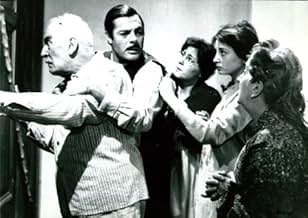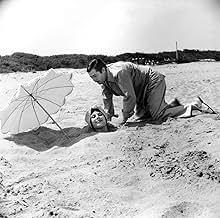IMDb RATING
7.9/10
15K
YOUR RATING
A married Sicilian baron falls in love with his cousin and vows to wed her, but with divorce illegal he must concoct a crime of passion to do away with his wife.A married Sicilian baron falls in love with his cousin and vows to wed her, but with divorce illegal he must concoct a crime of passion to do away with his wife.A married Sicilian baron falls in love with his cousin and vows to wed her, but with divorce illegal he must concoct a crime of passion to do away with his wife.
- Won 1 Oscar
- 12 wins & 9 nominations total
Storyline
Did you know
- TriviaThe "honor killing" law, which provided mitigating circumstances for anyone who killed his "spouse, daughter or sister" (or their lover) upon discovering them "in illegitimate carnal relations", was definitely abrogated in Italy in 1981, exactly 20 years after the release of this movie.
- GoofsWhen Ferdinando gets in bed with Rosalia after their fight, Rosalia's head facings change significantly between shots.
- Quotes
Ferdinando Cefalù: Have you really got another headache?
- ConnectionsEdited into Lo schermo a tre punte (1995)
Featured review
(Note: Over 500 of my movie reviews are now available in my book "Cut to the Chaise Lounge or I Can't Believe I Swallowed the Remote!" Get it at Amazon.)
Divorzio all'italiana is a richly textured satire of Sicilian macho Catholic life styles starring one of Italy's greatest actors, Marcello Mastroianni. He is a bit Chaplinesque in this tongue in cheek exploration of how to dump your wife and marry your 16-year-old cousin. His wide-eyed, dead pan expressions combined with vulnerability and suave, leading-man good looks made him the heart-throb of women for decades. He plays a bored baron stuck with a baroness (played fatuously by Daniela Rocca) that he cannot abide. It should be noted that today it IS possible to get a divorce in Italy, but at the time it was very difficult, perhaps easier to get an annulment, and so we have the premise of the plot.
Stefania Sandrelli, who became one of the great ladies of the Italian cinema, plays the cousin. She was only 15 when the film was shot but could easily pass for, say, 18. She is sensual, sweet and a bit naughty. In the final scene, famous for its fitting irony, the last thing we see are her feet. I won't tell you more, but the movie is almost worth seeing just for that final scene.
Rocca's Rosalia on the other hand is more syrupy than sweet and would qualify as clinging. She could smother a lumberjack, and although it is not polite to comment unfavorably on a lady's looks, I must note that she seemed to be having a bad facial hair day, everyday. Her impersonation of a country baroness nonetheless was unforgettable. I also liked 16-year-old Margherita Girelli as Sisini, the maid. Her coquettish ways helped to lend a French bedroom farce flavor to the film.
But what really makes this one of the great monuments of the Italian cinema is the witty and delightful script by Ennio De Concini (it won an Academy Award in 1962) and the detailed, textured direction by Pietro Germi. The picture that Germi paints of life in a small Sicilian (or southern Italian, for that matter) village is picturesque, much imitated, and indelible. The crowded ornate clutter of the old estate, the sun-drenched streets and the monolithic stone and mason churches haunt our memory. True, the film starts a bit slowly and drags (at least for modern audiences) a bit at times, but don't make the mistake of giving up on this. The latter half of the film is wonderful. And remember, if you had to go to film school, Divorce Italian Style would be on the syllabus.
So see this for Mastroianni of course but also because no film education would be complete without having seen Divorzio all'italiana.
The Criterion Collection DVD includes a second disc with a documentary on Germi's career, an interview with Ennio De Concini, and screen-test footage of Stefania Sandrelli and Daniela Rocca that I just had to see. There is also a booklet with reviews of the film from Stuart Klawans, Andrew Sarris, and Martin Scorsese. Scorsese's review is adoring and nostalgic since he is from Sicily and since the film had made such a lasting impression on him as a 19-year-old. For him the film was not so much a comedy as a true reflection of a life he and his family had known. He writes, "Every detail in Divorce Italian Style is so truthful and right that all Germi had to do was heighten everything a bit to make it funny."
Divorzio all'italiana is a richly textured satire of Sicilian macho Catholic life styles starring one of Italy's greatest actors, Marcello Mastroianni. He is a bit Chaplinesque in this tongue in cheek exploration of how to dump your wife and marry your 16-year-old cousin. His wide-eyed, dead pan expressions combined with vulnerability and suave, leading-man good looks made him the heart-throb of women for decades. He plays a bored baron stuck with a baroness (played fatuously by Daniela Rocca) that he cannot abide. It should be noted that today it IS possible to get a divorce in Italy, but at the time it was very difficult, perhaps easier to get an annulment, and so we have the premise of the plot.
Stefania Sandrelli, who became one of the great ladies of the Italian cinema, plays the cousin. She was only 15 when the film was shot but could easily pass for, say, 18. She is sensual, sweet and a bit naughty. In the final scene, famous for its fitting irony, the last thing we see are her feet. I won't tell you more, but the movie is almost worth seeing just for that final scene.
Rocca's Rosalia on the other hand is more syrupy than sweet and would qualify as clinging. She could smother a lumberjack, and although it is not polite to comment unfavorably on a lady's looks, I must note that she seemed to be having a bad facial hair day, everyday. Her impersonation of a country baroness nonetheless was unforgettable. I also liked 16-year-old Margherita Girelli as Sisini, the maid. Her coquettish ways helped to lend a French bedroom farce flavor to the film.
But what really makes this one of the great monuments of the Italian cinema is the witty and delightful script by Ennio De Concini (it won an Academy Award in 1962) and the detailed, textured direction by Pietro Germi. The picture that Germi paints of life in a small Sicilian (or southern Italian, for that matter) village is picturesque, much imitated, and indelible. The crowded ornate clutter of the old estate, the sun-drenched streets and the monolithic stone and mason churches haunt our memory. True, the film starts a bit slowly and drags (at least for modern audiences) a bit at times, but don't make the mistake of giving up on this. The latter half of the film is wonderful. And remember, if you had to go to film school, Divorce Italian Style would be on the syllabus.
So see this for Mastroianni of course but also because no film education would be complete without having seen Divorzio all'italiana.
The Criterion Collection DVD includes a second disc with a documentary on Germi's career, an interview with Ennio De Concini, and screen-test footage of Stefania Sandrelli and Daniela Rocca that I just had to see. There is also a booklet with reviews of the film from Stuart Klawans, Andrew Sarris, and Martin Scorsese. Scorsese's review is adoring and nostalgic since he is from Sicily and since the film had made such a lasting impression on him as a 19-year-old. For him the film was not so much a comedy as a true reflection of a life he and his family had known. He writes, "Every detail in Divorce Italian Style is so truthful and right that all Germi had to do was heighten everything a bit to make it funny."
- DennisLittrell
- Jan 3, 2007
- Permalink
- How long is Divorce Italian Style?Powered by Alexa
Details
- Release date
- Country of origin
- Language
- Also known as
- Scheidung auf italienisch
- Filming locations
- Ispica, Ragusa, Sicily, Italy(the Cefalus' hometown)
- Production companies
- See more company credits at IMDbPro
Box office
- Gross worldwide
- $131,467
- Runtime1 hour 45 minutes
- Color
- Aspect ratio
- 1.85 : 1
Contribute to this page
Suggest an edit or add missing content


![Watch Trailer [OV]](https://m.media-amazon.com/images/M/MV5BY2IwZTI1YmUtNTg4YS00OTNlLTkyYjUtZTE5ZjA5MTc4OGI1XkEyXkFqcGdeQXRyYW5zY29kZS13b3JrZmxvdw@@._V1_QL75_UX500_CR0)


























